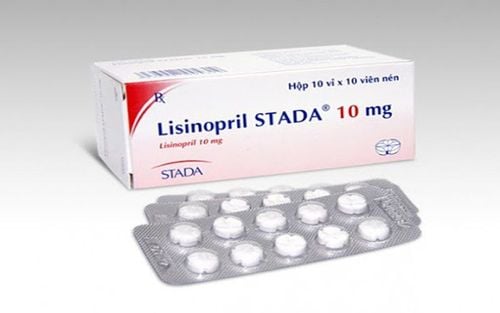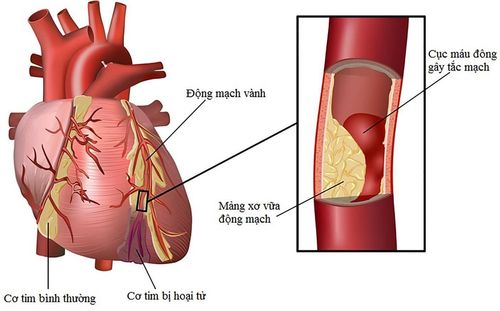This is an automatically translated article.
The article is professionally consulted by Cardiologist - Department of Examination & Internal Medicine - Vinmec Phu Quoc International General Hospital.Cardiovascular disease is one of the diseases causing high mortality, especially for patients over 40 years old and is of top concern worldwide. Therefore, cardiovascular risk assessment is really necessary because doing this can help us avoid the serious consequences that cardiovascular disease causes.
1. What are cardiovascular risk factors?
Cardiovascular disease risk factors are those associated with an increased likelihood of cardiovascular disease. People with cardiovascular risk factors are more likely to develop cardiovascular disease than people without these factors, but not necessarily. Cardiovascular risk factors are often associated with each other and increase the likelihood of disease, so it is important to assess cardiovascular risk based on these factors.1.1. Cardiovascular risk factors that cannot be changed or are difficult to change Age: the older you are, the higher your chances of developing the disease. Gender: Men are more likely to develop cardiovascular disease than women. Heredity: a family history of premature heart disease. People with chronic kidney disease. People with psychological stress. People with signs of stopping breathing during sleep. 1.2. Modifiable cardiovascular risk factors People with high blood pressure . People with dyslipidemia. Smoker. Overweight and obese people. People who are less physically active. People with impaired glucose tolerance or diabetes. People with unscientific diets such as eating too much salt, eating less vegetables ...
2. What is the overall cardiovascular risk?
Overall cardiovascular risk, also known as cardiovascular risk, is a concept that reflects the total risk of cardiovascular disease occurrence in a patient over a specified period of time, usually assessed over 10 years.Overall cardiovascular risk is classified into 4 levels as follows:
Low: risk of dying within 10 years < 1%. Moderate: 10-year risk of death from 1% to 5%. High: risk of dying within 10 years from 5% to 10%. Very high: 10-year risk of death ≥ 10%.

Nguy cơ tim mạch tổng thể được phân thành 4 mức độ: Thấp, trung bình, cao và rất cao
3. How to estimate cardiovascular risk?
To estimate overall cardiovascular risk, the following scores are commonly used to predict the likelihood that a patient will develop cardiovascular disease within the next 10 years.Current cardiovascular risk assessment systems include two types of cardiovascular risk prediction charts or cardiovascular risk assessment tables, Framingham and EURO-Score.
2 of these scales are built based on factors such as age, sex, blood pressure index, blood cholesterol index, diabetes status, smoking... Through these parameters, the disease The patient's total score is calculated and thus the cardiovascular risk over the next 10 years is calculated.
3.1. Age This is the most important predictor of disease because most elderly people have a very high risk of cardiovascular disease. This is an irreversible cardiovascular risk.
3.2. Gender Men are at higher risk of cardiovascular disease than women. However, postmenopausal elderly women are also likely to have cardiovascular disease, so it is very important to pay attention to this case.
3.3. Genetics People with a family member with cardiovascular disease, especially a male member before the age of 55 and a female member before the age of 65, have a higher risk of cardiovascular disease.
In addition to a family history of early disease, people of the African American race are also at greater risk for cardiovascular disease because they are more likely to have diabetes and high blood pressure than Caucasians. .
3.4. Hypertension This is one of the most common cardiovascular risk factors. This sign of high blood pressure is very dangerous, with few clinical symptoms, but it is a risk of cardiovascular disease and dangerous cardiovascular complications.
In addition, hypertension is also associated with other cardiovascular risks such as obesity, high cholesterol, blood triglycerides, diabetes... Therefore, it is necessary to effectively treat hypertension in patients. .
3.5. Hypercholesterolemia and associated dyslipidemia This is a modifiable cardiovascular risk. Blood cholesterol consists of two most important components: high molecular weight cholesterol (HDL-C) and low molecular weight cholesterol (LDL-C). Cardiovascular disease occurs when the level of LDL-C, and when the concentration of HDL-C increases, it protects our body, so if the level of HDL-C falls low, it is also a cardiovascular risk factor.
In addition, increased triglycerides - a component of blood fats also increase cardiovascular risk. The above lipid disorders are also accompanied by diseases such as diabetes, hypertension.
Patients should be tested for blood lipid levels, especially after age 40. Followed by maintaining a scientific diet and exercising in moderation to balance blood lipids. Patients with dyslipidemia are also treated with drugs to regulate blood lipid levels.
3.6. Smoking Cigarette smoking is a risk factor for coronary heart disease, peripheral blood disease, lung cancer and stroke. People who breathe in secondhand smoke even though they don't smoke can also get sick.

Hút thuốc lá yếu tố nguy cơ của bệnh lý mạch vành
To get the right weight (kilograms) for height (meters), usually based on body mass index BMI (kg/m2), for Asians, normal BMI 18.5-22.9.
3.8. Diabetes People with diabetes, especially type II diabetes, have a higher rate of cardiovascular disease and stroke than the general population. This is a risk factor for cardiovascular death.
4. Conclusion
Cardiovascular risk assessment includes the assessment of many factors in the cardiovascular risk assessment system such as age, sex, smoking, blood cholesterol levels, etc. 10 years can help patients predict the disease, thereby having the most appropriate treatment.Vinmec International General Hospital now has a Cardiovascular Screening Package - Cardiovascular Basic Examination, helping customers to detect cardiovascular diseases even when there are no symptoms, so that they can have early treatment to prevent cardiovascular diseases. deliver optimal results.
Please dial HOTLINE for more information or register for an appointment HERE. Download MyVinmec app to make appointments faster and to manage your bookings easily.













